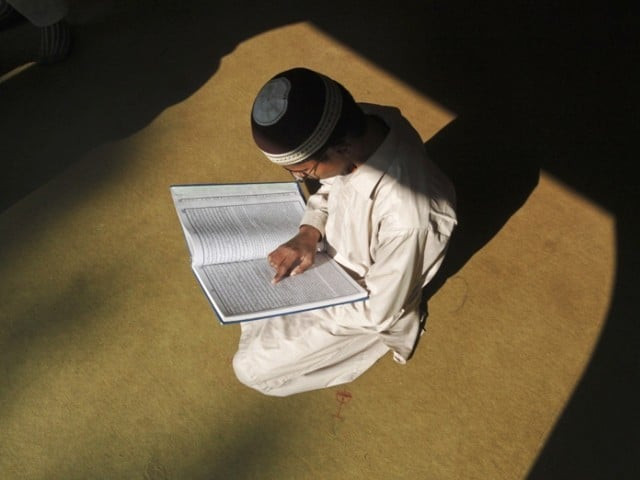Uniform standards: Most unregistered Madaris in K-P, says officials
While there are 8,249 un-registered Madaris in country

While there are 8,249 un-registered Madaris in country . PHOTO: REUTERS
There are 35,337 registered and 8,249 un-registered Madaris (Islamic seminaries) in the country, officials in the ministries of interior and religious affairs told The Express Tribune on Saturday.
According to the break-up, around 16,000 seminaries are registered with the Auqaf department of Punjab; 13,000 in Balochistan; 3,136 in Khyber-Pakhtunkhwa; 2,800 in Sindh and 401 Madaris are registered with the Auqaf Department of Islamabad, the officials said. About the unregistered Madaris, the officials said that 4,135 seminaries are in K-P; 2,411 in Punjab; 1,406 in Sindh; 266 in Balochistan and 31 in Islamabad.
The government and the Ittehad Tanzeemul Madaris Pakistan (ITMP), an umbrella organisation of Madaris of five schools of thought, have agreed to register all seminaries by adopting a previous agreement that guarantees modern Madaris in the country.
“We want the Madaris to teach religious as well as secular subjects. No Madrassa will be allowed to teach or publish literature which promotes extremism or sectarianism,” Religious Affairs Minister Sardar Muhammad Yousaf told The Express Tribune.
If the understanding translates into a legally binding agreement, the ITMP would directly be linked with the ministries of education, religious affairs and interior, Yousaf said, adding that the stakeholders have evolved a consensus on the implementation of the 2010 agreement between the government and the ITMP.
An official privy to the development said the government would set up an authority or a board in the Centre to bring ITMP representatives on a single platform in order to ensure uniformity and standard of religious education in the country.
Under the 2010 draft agreement, the ITMP representatives agreed to include compulsory secular subjects in the curriculum of Sanvia Amma (equivalent of Secondary School Certificate) and Sanvia Khassas (equivalent of Intermediate). Similarly, Madaris will submit their financial statements to the ministry of religious affairs.
Though a consensus has been evolved on the registration of Madaris, some religious scholars claimed that the government has mounted a crackdown on seminaries, particularly in Punjab. “The government has started a crackdown against our seminaries without any notice,” Allama Tahir Ashrafi, the chairman of the Pakistan Ulema Council, told The Express Tribune.
Police have kept eight under detention so far, he claimed. “Our Madaris are open for all. Anyone can come and see if they are peaceful or promoting extremism,” he added.
Past legislation
Two laws had been passed in the past: one in 2001 to create state-controlled Madaris, or model Dini Madaris; and the other in 2002 to register and control all the Madaris. The first move was a partial success as some religious institutions registered in 2003 with the Pakistan Madrassa Education Board created by this law.
However, the three alternative institutions it created suffer from organisational difficulties. The second measure proved unpopular with Madaris, but the government has restricted access of foreign students to the Madrassa education system.
Published in The Express Tribune, January 18th, 2015.













COMMENTS
Comments are moderated and generally will be posted if they are on-topic and not abusive.
For more information, please see our Comments FAQ